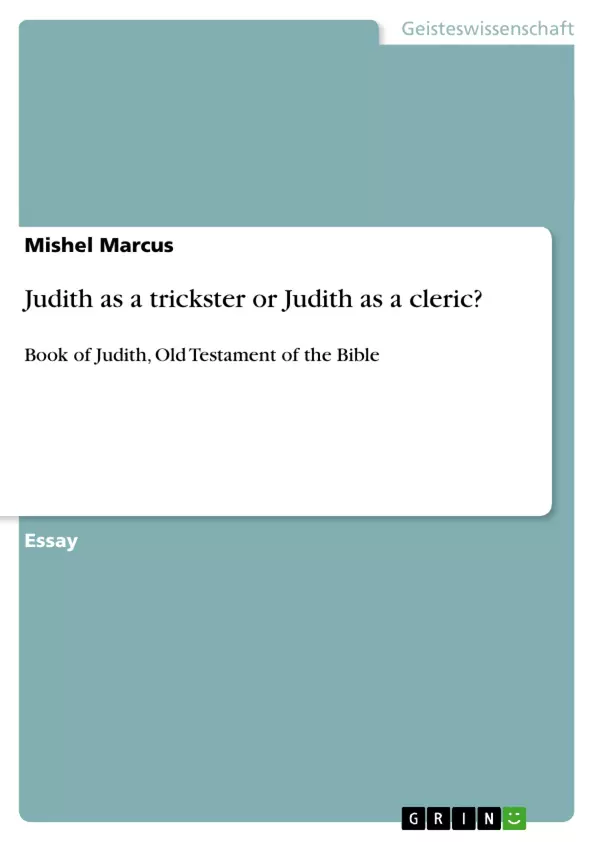The Book of Judith is part of the Old Testament of the Bible. In contrast to other books of the Bible, the story is wholly fictional and just composed in order to outline the history of the Israeli throughout the previous 400 years. The book is written in the second or third century before Christ and is divided into 16 chapters. The story deals with Judith, a pious widow who is able to defeat Holofernes, who besieged her town Bethulia. Holofernes, a general under the Assyrian king Nebuchadnezzar was ordered to conquer and punish all countries which did not help him in his campaign against the Meder. As all countries in Asia Minor and Syria were conquered, the army reached Bethulia which they besieged as it was the only city which did not surrender. Despite the fact that the inhabitants of Bethulia gave up hope, Judith was the only one who relied on God. She left the besieged city and went down to Holofernes’s camp where she pretended to be a defector. Blinded by her beauty and her wisdom, Holofernes allowed her access to his tent where Judith used her chance and decapitated him as he was sleeping drunk in his bed. With this action she saved her town and the Israeli.
Individual Research Report
The Book of Judith is part of the Old Testament of the Bible. In contrast to other books of the Bible, the story is wholly fictional and just composed in order to outline the history of the Israeli throughout the previous 400 years. The book is written in the second or third century before Christ and is divided into 16 chapters. The story deals with Judith, a pious widow who is able to defeat Holofernes, who besieged her town Bethulia. Holofernes, a general under the Assyrian king Nebuchadnezzar was ordered to conquer and punish all countries which did not help him in his campaign against the Meder. As all countries in Asia Minor and Syria were conquered, the army reached Bethulia which they besieged as it was the only city which did not surrender. Despite the fact that the inhabitants of Bethulia gave up hope, Judith was the only one who relied on God. She left the besieged city and went down to Holofernes’s camp where she pretended to be a defector. Blinded by her beauty and her wisdom, Holofernes allowed her access to his tent where Judith used her chance and decapitated him as he was sleeping drunk in his bed. With this action she saved her town and the Israeli.
The Book of Judith therefore tells us a story of a woman who is able to kill a mighty warrior on her own only with the help of God on whom she relied. Judith’s image has gone through many changes throughout the history which differs from a pious theologian to a trickster. In the following, I am going to analyze these images in order to contrast them. My aim is to find out which image suits better: Judith as a trickster or Judith as a cleric?
Already in the medieval times, different views of Judith existed as those were largely a result of ideas in poems brought up by different authors. On the one hand, she was praised for her chastity and her refusal to dishonor her body with impure beverage and food (Estes 326). On the other hand, there was also a different view of Judith: Judith as a trickster which only was able to defeat Holofernes with the help of her stunning beauty (ibid. 327-328).
First of all, I am going to start with the trickster image of Judith. She is described as “[…] very beautiful, charming to see” (Jdt 8,7) but this is also connected with a moral degradation as beauty is equated with evilness and furtiveness. This can also be found in the story itself where she kills Holofernes but also in her speech to Holofernes where she succeed in persuading Holofernes to wait for her signal when to attack Bethulia as she would know if the Israeli would sin against their God. Holofernes is seduced by her speech but even more stunned by her beauty. If you take a closer look at the speech, you will see that Judith uses several techniques to achieve her aim. First of all, she flatters Holofernes by saying that the Israeli “[…] have indeed heard of [his] genius and adroitness of mind” (Jdt 11,11) with which she states that Holofernes genius was announced in the whole world and that he exceeded other generals (Schmitz 335). The second technique she uses is irony. She implies ambiguities in her speech, e.g. when she promises that Holofernes will be successful in Judaea.
[...]
Frequently Asked Questions
Is the Book of Judith a historical account?
No, the Book of Judith is considered wholly fictional, composed in the 2nd or 3rd century BC to outline Jewish history through a religious narrative.
How did Judith defeat Holofernes?
Judith, a pious widow, entered the camp of the Assyrian general Holofernes, gained his trust through her beauty and wisdom, and decapitated him while he was drunk.
What are the two main interpretations of Judith's character?
She is often viewed either as a "cleric" (a pious theologian relying on God) or as a "trickster" (using seduction and irony to achieve her goals).
How does Judith use irony in her speech to Holofernes?
She uses ambiguities and flattery, promising Holofernes success while implying that his downfall is imminent due to his pride.
What was the town Judith saved?
Judith saved the town of Bethulia, which was the only city that had not surrendered to King Nebuchadnezzar's forces.
- Citation du texte
- Mishel Marcus (Auteur), 2013, Judith as a trickster or Judith as a cleric?, Munich, GRIN Verlag, https://www.grin.com/document/269515



